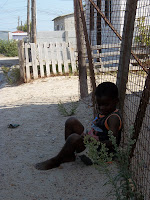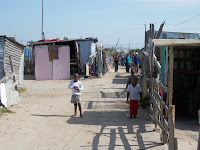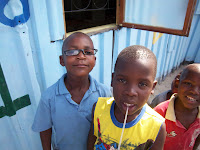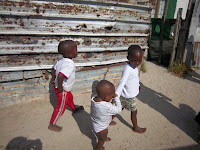 Make sure you carry a spare wallet. And a fake credit card – like a Ralph’s loyalty card or something you don’t care about anymore.
Make sure you carry a spare wallet. And a fake credit card – like a Ralph’s loyalty card or something you don’t care about anymore.What! Why??
 That way, if you get mugged, you give them the fake credit card when they ask for your money. And throw the spare wallet in one direction as you run in the other.
That way, if you get mugged, you give them the fake credit card when they ask for your money. And throw the spare wallet in one direction as you run in the other.Are you serious? Cape Town’s not really that dangerous, is it?!
Well, the city’s not. But the townships….just make sure you don’t stop or slow down to talk to anyone there.
I have heard some crazy stories about townships.
 Equivalent essentially to the slums and projects housing America’s poorest of the poor, these townships are notorious for murders, drugs, carjackings, gangs, rape – essentially all the heinous crimes you see on Law and Order: SVU. And the stories our clinic patients tell us – one girl was raped by her grandfather, another was sold as a prostitute by her own brother – seem to corroborate the news stories we hear. The stories about foreign couples getting kidnapped and murdered, the stories about people being brutally shot or stabbed to death, the stories about gang initiations requiring one carjacking, one murder, and one stint in and out of prison.
Equivalent essentially to the slums and projects housing America’s poorest of the poor, these townships are notorious for murders, drugs, carjackings, gangs, rape – essentially all the heinous crimes you see on Law and Order: SVU. And the stories our clinic patients tell us – one girl was raped by her grandfather, another was sold as a prostitute by her own brother – seem to corroborate the news stories we hear. The stories about foreign couples getting kidnapped and murdered, the stories about people being brutally shot or stabbed to death, the stories about gang initiations requiring one carjacking, one murder, and one stint in and out of prison.
 Equivalent essentially to the slums and projects housing America’s poorest of the poor, these townships are notorious for murders, drugs, carjackings, gangs, rape – essentially all the heinous crimes you see on Law and Order: SVU. And the stories our clinic patients tell us – one girl was raped by her grandfather, another was sold as a prostitute by her own brother – seem to corroborate the news stories we hear. The stories about foreign couples getting kidnapped and murdered, the stories about people being brutally shot or stabbed to death, the stories about gang initiations requiring one carjacking, one murder, and one stint in and out of prison.
Equivalent essentially to the slums and projects housing America’s poorest of the poor, these townships are notorious for murders, drugs, carjackings, gangs, rape – essentially all the heinous crimes you see on Law and Order: SVU. And the stories our clinic patients tell us – one girl was raped by her grandfather, another was sold as a prostitute by her own brother – seem to corroborate the news stories we hear. The stories about foreign couples getting kidnapped and murdered, the stories about people being brutally shot or stabbed to death, the stories about gang initiations requiring one carjacking, one murder, and one stint in and out of prison. And now here we were, on our way to the infamous township of Khayelitsha. I was apprehensive, sitting on my purse to hide it from view, and keeping my car window and door securely closed and locked, even though it was a million degrees outside, and even the slightest breeze would have been refreshing.
And now here we were, on our way to the infamous township of Khayelitsha. I was apprehensive, sitting on my purse to hide it from view, and keeping my car window and door securely closed and locked, even though it was a million degrees outside, and even the slightest breeze would have been refreshing. Our guide kept reassuring us. The people in the township are quite nice. Everyone’s so friendly. Everyone wants you to know their story. Wants you to come into their home and sit. Wants you to play with their children. And when we got there, we got out of the car, locking the door out of habit. No no, she said. Leave the windows and doors unlocked. It’s perfectly safe.
Our guide kept reassuring us. The people in the township are quite nice. Everyone’s so friendly. Everyone wants you to know their story. Wants you to come into their home and sit. Wants you to play with their children. And when we got there, we got out of the car, locking the door out of habit. No no, she said. Leave the windows and doors unlocked. It’s perfectly safe.There were children playing with each other in the roads, and upon seeing our guide, they greeted her happily, yelling out “white foam” in Xhosa – their name for her, since her skin is as white as the foam upon the ocean. And even more children appeared out of the woodwork and from the sides of shacks and sheds to greet us. Mowla, cahn-jah-nee. They followed us around their neighborhood, picking up more children as we went, every now and then instructing us “photo! photo!” as they happily posed and smiled for the camera.
 I gave one boy my Coke as the other children were preoccupied with Jean’s digital camera. He grinned excitedly, not quite believing that I was really giving the whole thing to him. Hiding the bottle under his shirt, he rushed over to his best friend, and after whispering in his ear, the two ran off on their own, looking back just twice to make sure they weren’t being followed and consequently wouldn’t have to share their newfound treasure.
I gave one boy my Coke as the other children were preoccupied with Jean’s digital camera. He grinned excitedly, not quite believing that I was really giving the whole thing to him. Hiding the bottle under his shirt, he rushed over to his best friend, and after whispering in his ear, the two ran off on their own, looking back just twice to make sure they weren’t being followed and consequently wouldn’t have to share their newfound treasure. It was quite a change from what I had been expecting. Instead of people swarming us, pressing us to give them money, there were children everywhere wanting us to take their pictures and hold their hands. Instead of looking at us complete strangers as outsiders, they hugged us and welcomed us into their families. They wanted us to know the injustices and the prejudices that were going on against them. The racial stereotypes that were being perpetuated by the wealthier community. The broken promises the government kept telling them.
It was quite a change from what I had been expecting. Instead of people swarming us, pressing us to give them money, there were children everywhere wanting us to take their pictures and hold their hands. Instead of looking at us complete strangers as outsiders, they hugged us and welcomed us into their families. They wanted us to know the injustices and the prejudices that were going on against them. The racial stereotypes that were being perpetuated by the wealthier community. The broken promises the government kept telling them.Yet, most of all, they wanted to show us that they were a community that could not be broken. True, they had been forced out of their homes and into shacks that couldn't keep out the fierce wind and cold in the winter, and became boiling metal boxes in the summer. But they were also a community, looking out for each other, forging a new home for themselves - using material salvaged from the garbage yards.